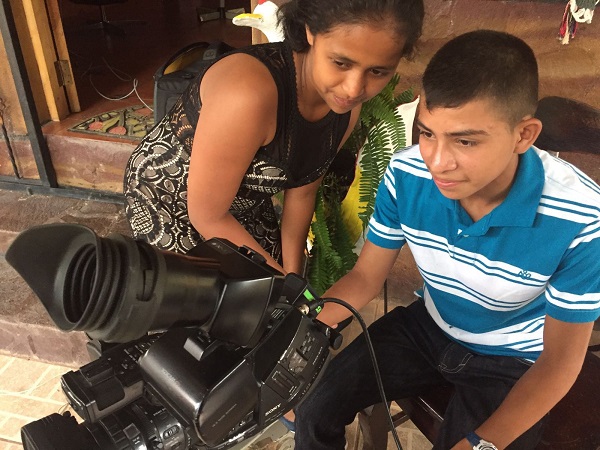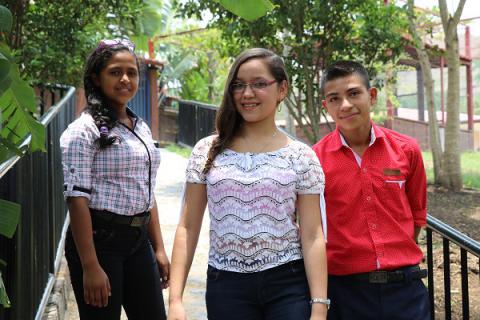 Nicaragua
Nicaragua
Languages
Matagalpa and Florida connected
Just a few minutes after the end of a webcast linking up young people from Nicaragua and the United States, broadcast on the Nicaraguan side from the municipality of San Ramón in the department of Matagalpa, 145 km from the capital city of Managua, I meet with three of the participants. They are 15-year-old Ninoska from the community of El Coyolar in the municipality of El Tuma-La Dalia, department of Matagalpa; 14-year-old Jasmir from the community of San Miguel de Kilambé in the municipality of El Cuá, department of Jinotega; and 15-year-old Anielka from the community of La Perlita in the municipality of Jinotega, in the department of the same name. The three young people smiling at me are still feeling a buzz after what they have just done.
“It’s been an unforgettable experience,” says Anielka right away. Jasmir, who is next to her, adds that “I was nervous, but it made me happy because it’s very nice to have the chance to talk with young people a long way away.” Ninoska, who is more deliberate, explains that this was the first time she recorded a video and talked with people from other countries. “I felt very excited and nervous at the same time,” she recalls.
Ninoska, Jasmir and Anielka represented the young people of Nicaragua in this webcast that involved a conversation with four students from Florida in the USA. During the event, they talked about their dreams and the challenges facing them, as well as the knowledge they acquired in the framework of the “Cup of Excellence with Young Entrepreneurs” project, which started in September 2016 in Jinotega and Matagalpa, with funds from the Keurig Green Mountain-Judith Haskell Brewer Fund and the Bezos Foundation. It is thanks to the Bezos Foundation that this webcast was possible through the Students Rebuild (studentsrebuild.org) YouTube channel, which is one of the Foundation’s initiatives.
During the broadcast, they were able to share information about their business initiatives and how they have developed skills to ensure the efficiency of their entrepreneurial undertakings. “It’s very nice to talk about our dreams, obstacles and country,” Anielka says. “They asked us about the beautiful things in Nicaragua, what it’s like as a country and also about our typical foods.” Meanwhile, Ninoska reflects about how we sometimes have preconceived ideas about other countries and cultures. “First of all, I realized that in Miami not everything’s a bed of roses, as they say,” she explains. “What made most of an impact on me were Laura and Sebastian’s stories. I thought they didn’t have so many problems.”
This whole experience started a few weeks earlier when Yasmina Padilla, coordinator of Child Poverty Programme, visited to tell them they had been selected. “I didn’t know what a webcast was,” admits Ninoska. “I thought we were going to talk, but I didn’t know we were going to be able to ask them questions or that they were going to ask us things,” adds Jasmir. Anielka also says frankly that she did not know that this kind of broadcast even existed: “I just said ‘what is it?’ and asked questions to try and understand it. Yasmina told me it was a video and that we were going to interact with kids from the United States.”
When I ask them how it went during the webcast, Jasmir explains that being live on air is complicated, because “sometimes we did get confused, but in the end we did well because we’d practiced.” All three of them are happy with their participation.
Ninoska, Jasmir and Anielka are some of the 535 young people between the ages of 14 and 25 that are receiving comprehensive support to organize their livelihoods and take the right decisions about their future. This includes the development of a set of skills related to job hunting, personal financial education, developing an entrepreneurial spirit, and accessing credit in order to promote their life projects.

Both Ninoska and Anielka are promoters, along with around 30 other young people. They receive training on different business proposals, entrepreneurial activities and life skills, and then they each replicate them with groups of ten young people. Ninoska feels that there should be more opportunities like this webcast. “For me, all the project promoters should experience it,” she says, adding that it allowed her to learn to work in a group with other people who are different to those she coordinates in her project group.
“The first thing I’m going to tell my group is that we met youngsters from the United States,” Anielka says. “The second thing I’ll say is that we told them about our dreams and they told us about theirs, so that was something very special. I’ll also talk to them about the place and that we spent the week practicing so we wouldn’t get confused about anything when it happened.” Ninoska adds that “When I meet my group, I’m going to tell them everything that’s happened here, if I remember it all that is…”
Ninoska, Jasmir and Anielka are happy and it shows. They have become friends during the time they spent preparing for the webcast and have also made new friends beyond Nicaragua’s borders. “They treated and trained us very well to achieve good results at the end,” Anielka explains. “When you set yourself goals and achieve them, you feel satisfied. It’s satisfying.”
“We exchanged telephone numbers and social networks to keep in contact by WhatsApp, Facebook and Instagram,” says an excited Anielka. “I didn’t think it would end up like it did,” added Jasmir. “They were really excited, just like us. They were asking us questions because two of them speak Spanish.” So 40 minutes of digital alliance with four young people in Florida have produced results and this has definitely been a successful connection between Matagalpa and Florida.
